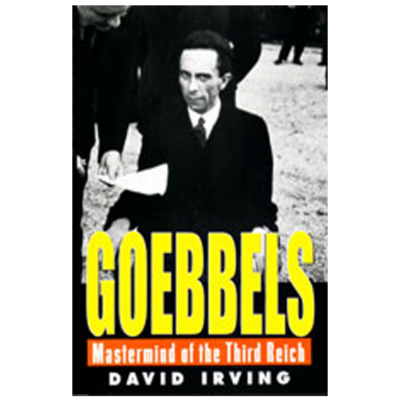Showing 1–38 of 58 results
Product categories
Top rated products
-
 Goebbels. Mastermind of the Third Reich
Rated 5.00 out of 5£ 11.67 – £ 45.89
Goebbels. Mastermind of the Third Reich
Rated 5.00 out of 5£ 11.67 – £ 45.89 -
 Uprising! Hungary 1956: One Nation's Nightmare
Rated 5.00 out of 5£ 10.11 – £ 37.34
Uprising! Hungary 1956: One Nation's Nightmare
Rated 5.00 out of 5£ 10.11 – £ 37.34 -
 The Night the Dams Burst
Rated 5.00 out of 5£ 7.77 – £ 17.11
The Night the Dams Burst
Rated 5.00 out of 5£ 7.77 – £ 17.11 -
 Apocalypse 1945: The Destruction of Dresden
Rated 5.00 out of 5£ 8.36 – £ 36.56
Apocalypse 1945: The Destruction of Dresden
Rated 5.00 out of 5£ 8.36 – £ 36.56 -
 ROMMEL: The Trail of the Fox
Rated 5.00 out of 5£ 8.75 – £ 38.12
ROMMEL: The Trail of the Fox
Rated 5.00 out of 5£ 8.75 – £ 38.12
Recent reviews
-
 The Hitler's War Exclusive Collection (Book & DVD)
Rated 5 out of 5by Marko
The Hitler's War Exclusive Collection (Book & DVD)
Rated 5 out of 5by Marko -
 David Irving on the David Frost Programme 1977
Rated 5 out of 5by Najeeb Nasir
David Irving on the David Frost Programme 1977
Rated 5 out of 5by Najeeb Nasir -
 The Virus House
Rated 0 out of 5by admin
The Virus House
Rated 0 out of 5by admin -
 ROMMEL: The Trail of the Fox
Rated 5 out of 5by Stephen O'Connell
ROMMEL: The Trail of the Fox
Rated 5 out of 5by Stephen O'Connell -
 The War Path: Hitler's Germany 1933-1939
Rated 5 out of 5by Najeeb Nasir
The War Path: Hitler's Germany 1933-1939
Rated 5 out of 5by Najeeb Nasir -
 Apocalypse 1945: The Destruction of Dresden
Rated 5 out of 5by Gabe C.
Apocalypse 1945: The Destruction of Dresden
Rated 5 out of 5by Gabe C. -
 Göring
Rated 5 out of 5by Dan L.
Göring
Rated 5 out of 5by Dan L. -
 DVD: Ich komme wieder (German)
Rated 5 out of 5by veronikac2br
DVD: Ich komme wieder (German)
Rated 5 out of 5by veronikac2br -
 Hitler's War, Millennium Edition (2019)
Rated 5 out of 5by [email protected]
Hitler's War, Millennium Edition (2019)
Rated 5 out of 5by [email protected] -
 True Himmler (2020)
Rated 5 out of 5by [email protected]
True Himmler (2020)
Rated 5 out of 5by [email protected]
-
David Irving Books
Hitler’s War, Millennium Edition (2019)
Rated 5.00 out of 5£ 19.45 – £ 58.34 Select options This product has multiple variants. The options may be chosen on the product pageDavid Irving’s standard work on Adolf Hitler based on diaries and documents exclusively available to him and thirty years of research and interviews with Hitler’s generals and private staff. Jacketed hardback, with new picture sections. Cheaper than Amazon! and eBay!
-
David Irving Books
Churchill’s War, Volume I: The Struggle for Power
Rated 5.00 out of 5£ 16.34 – £ 38.12 Select options This product has multiple variants. The options may be chosen on the product pageChurchill’s War, Volume I: The Struggle for Power is David Irving’s standard work on the early years of Winston Churchill and his war, based, like his work on Hitler, on and interviews and documents exclusively available to him, and thirty years of research in British and international archives.
This first volume chronicles an almost unbroken series of disasters in his life, from Gallipoli and the Chanak crisis to the defeat of France and the military fiasco in Greece. Jacketed casebound, a limited edition of a de luxe boxed copy, will be available to those who order early.
Myths and Realities: The Untold Story of Churchill and Britain’s War Aims
“No way what I’m saying this evening can possibly be regarded as anti-British in any sense. What I’m trying to do is detract from a central part of the British legend, namely, Winston Churchill himself,… pic.twitter.com/viaTwUZmQv
— David Irving (@irving_books) April 9, 2024
-
David Irving Books
Goebbels. Mastermind of the Third Reich
Rated 5.00 out of 5£ 11.67 – £ 45.89 Select options This product has multiple variants. The options may be chosen on the product pageDavid Irving’s much-sought 1996 biography of Joseph Goebbels, Hitler’s propaganda chief. Out of print since 2001, now reprinted in better quality than ever, with forty pages of original photographs, many in colour, 724 pages. (hardback).
How can two simple words create a global phenomenon of misinformation? Find out in our newest video.https://t.co/l82LX6CTPC#HolocaustDenier #HolocaustDenial #Holocaust #Goebbels #Lies #Truth #RealHistory #DavidIrving pic.twitter.com/yrPFnKbreU
— David Irving (@irving_books) May 28, 2024
-
David Irving Books
True Himmler (2020)
Rated 5.00 out of 5£ 11.67 – £ 50.56 Select options This product has multiple variants. The options may be chosen on the product pageTrue Himmler. David Irving’s dissenting work on Heinrich Himmler is based on actual letters, diaries, and documents exclusively available to him and on twenty years of research and interviews with Himmler’s generals and private staff, including an analysis of his murder on May 23, 1945, by a special British killing unit.
Hardback, with hundreds of original black-and-white and color photographs from Himmler’s albums.
-
Books
Churchill’s War, vol II: Triumph in Adversity
Rated 5.00 out of 5£ 49.53 Add to basketChurchill’s War, vol II: Triumph in Adversity is David Irving’s standard work on the middle years of Winston Churchill and his war, based, like his work on Hitler, on documents exclusively available to him and over thirty years of research and interviews and British and international archives. The second volume of Churchill’s War covers the middle years of this disastrous conflict.
After the first volume chronicled an almost unbroken series of disasters in his life, from Gallipoli and the Chanak crisis to the defeat of France and the military fiasco in Greece, the second sees him enter happier times, with great naval victories, El Alamein and the landings in North Africa. This book is a “stand-alone” book and does not require reading the first volume to understand or appreciate the story—jacketed hardback.
-
David Irving Books
Apocalypse 1945: The Destruction of Dresden
Rated 5.00 out of 5£ 8.36 – £ 36.56 Select options This product has multiple variants. The options may be chosen on the product pageApocalypse 1945: The Destruction of Dresden was first published on April 30, 1963. Using official papers, private records, and the accounts of eye-witnesses on both sides, David Irving gives a harrowing account of the two saturation bombing raids executed by RAF Bomber Command on Germany’s most beautiful city at the end of the war, a horrific firestorm raid which left over 100,000 innocent civilians dead or missing—jacketed hardback.
-
David Irving Books
The Morgenthau Plan 1944-1945
Rated 0 out of 5£ 7.85 – £ 34.23 Select options This product has multiple variants. The options may be chosen on the product pageDavid Irving’s facsimile record and commentary on the infamous American policy for postwar Germany. If adopted, the Morgenthau Plan would have led to the death by starvation and pestilence of ten million Germans in the first two years after the war ended, in addition to the one million who had perished in the saturation bombing and the three million killed in the enforced expulsion from Germany’s eastern territories. Both Roosevelt and Churchill unthinkingly initiated the Plan, as these documents show. Now, for the first time in English. Laminated hardback.
-
David Irving Books
The War Path: Hitler’s Germany 1933-1939
Rated 5.00 out of 5£ 7.77 – £ 30.34 Select options This product has multiple variants. The options may be chosen on the product pageThe War Path: Hitler’s Germany 1933-1939 is a magnificent Focal Point reprint of a David Irving classic
From February 3, 1933, when he told his generals in secret of his ultimate ambition to invade and conquer the East, to September 3, 1939, when he left the Berlin Chancellery for the Polish front, Adolf Hitler had one obsessive goal – to wage war and achieve German revenge and hegemony.
David Irving’s exclusive interviews with Hitler’s staff and using original and unpublished firsthand material led him to search for documents and correspondence across Europe.
🔍 Did Hitler know about the Holocaust?🤔 Dive into the intriguing investigation spanning a decade to unravel the truth. #AdolfHitler #Holocaust #RealHistory #DavidIrving pic.twitter.com/cpf8SReO8e
— David Irving (@irving_books) May 23, 2024
-
Books
In His Own Words – Adolf Hitler
Rated 0 out of 5£ 16.34 Add to basket“In His Own Words” offers an unparalleled exploration into the speeches of Adolf Hitler, shedding light on the intricate nuances of his rhetoric and its profound influence on the history of the 20th century. This comprehensive collection, translated with meticulous attention to detail by C.J. Miller, spans over 275 pages of critical historical insights.
-
David Irving Books
Uprising! Hungary 1956: One Nation’s Nightmare
Rated 5.00 out of 5£ 10.11 – £ 37.34 Select options This product has multiple variants. The options may be chosen on the product pageUprising! Hungary 1956: One Nation’s Nightmare is as book by David Irving, described by a UK judge as the leading expert on World War II, examines the spontaneous 1956 uprising of the Hungarians against rule from Moscow – against the faceless, indifferent, incompetent functionaries who had turned their country into a pit of Marxist misery in one short decade: the funkies, Irving calls them, adapting the Hungarian word funkcionariusok.
He traced and questioned the men who had been kidnapped, exiled, imprisoned and put on trial with the prime minister Imre Nagy, who was sentenced to death, and members of Nagy’s family. It is Irving’s assessment of Imre Nagy that will raise eyebrows, together with his discovery among official records of evidence that antisemitism was one of the motors of the popular uprising.
The resulting study is an autopsy of a failed revolution, viewed both from inside the council chambers of the powerful and from street level. This is a compelling drama, with a cast of ten million.
The Guardian: “Irving skilfully combines sources . . . The result is disconcerting, rather like reading a film script, but it works particularly well.”
Laminated hardback.Discover the shocking revelations from @cia files on the Hungarian Uprising of 1956. Learn how an anti-communist revolution began as an anti-Jewish pogrom.https://t.co/NABzOhEweJ
#HungarianUprising #RealHistory #DavidIrving pic.twitter.com/xvV1rdBK6E
— David Irving (@irving_books) June 1, 2024
-
Bundle Products
The Hitler’s War Exclusive Collection (Book & DVD)
Rated 5.00 out of 5£ 75.14Original price was: £ 75.14.£ 62.23Current price is: £ 62.23. Add to basketThe Hitler’s War Exclusive Collection (Book & DVD) is an exclusive bundle that pairs the detailed “Hitler’s War Millennium Edition 2019” book with the captivating “Hitler’s War DVD”.
🔍 Did Hitler know about the Holocaust?🤔 Dive into the intriguing investigation spanning a decade to unravel the truth. #AdolfHitler #Holocaust #RealHistory #DavidIrving pic.twitter.com/cpf8SReO8e
— David Irving (@irving_books) May 23, 2024
-
David Irving Books
Hess: The Missing Years 1941-1945
Rated 5.00 out of 5£ 10.89 – £ 44.34 Select options This product has multiple variants. The options may be chosen on the product pageDive into the enigmatic world of Rudolf Hess’s wartime odyssey with David Irving’s Hess: The Missing Years 1941-1945. This compelling volume sheds light on one of World War II’s most mysterious episodes: the daring solo flight by Hitler’s deputy to Scotland in a bid to broker peace. This mission led to his lifelong incarceration. Irving’s painstaking research uncovers the hidden layers of this historical puzzle, drawing from secret British Intelligence files, medical records, and firsthand accounts to narrate a story that veers between tragedy and espionage thriller.
Rudolf Hess’s Mysterious Peace Mission: Unveiled
The intriguing tale of Rudolf Hess’s daring flight to Scotland during World War II to negotiate peace between Nazi Germany and Britain, defying Winston Churchill’s aggressive war strategies.
Delving deep into Hess’s elaborate… pic.twitter.com/YXW8ZmWrTq
— David Irving (@irving_books) May 13, 2024
-
Books
Göring
Rated 5.00 out of 5£ 44.58 Add to basketDavid Irving first published this best-selling biography of the second man in Hitler’s Germany, the famous “six-star” general, Reichsmarschall Hermann Göring, in 1989; it received brilliant reviews around the world. Laminated hardback.
-
David Irving Books
ROMMEL: The Trail of the Fox
Rated 5.00 out of 5£ 8.75 – £ 38.12 Select options This product has multiple variants. The options may be chosen on the product pageROMMEL: The Trail of the Fox is new hardback edition of the world’s best-known Rommel biography
-
Books
Voice of Triumph: Hitler’s Speeches at Nuremberg
Rated 0 out of 5£ 17.11 Add to basketVoice of Triumph: Hitler’s Speeches at Nuremberg encapsulates Adolf Hitler’s powerful oratory during the NSDAP rallies in Nuremberg, reflecting the regime’s ambitious portrayal and transformation of Germany. This 392-page edition explores a significant era through speeches that shaped a nation.
-
David Irving Books
Breach of Security
Rated 0 out of 5£ 30.34 Select options This product has multiple variants. The options may be chosen on the product pageDive into the shadowy world of espionage with David Irving’s groundbreaking historical account, “Breach of Security.” This meticulously researched book sheds light on the German secret Forschungsamt, the elusive intelligence agency tasked with wiretapping and code-breaking during the Nazi regime. First published in 1967, this compelling narrative remains one of the few detailed expositions on the agency that played a pivotal role in gathering intelligence leading up to the Second World War.
-
David Irving Books
Nuremberg, the Last Battle
Rated 0 out of 5£ 11.67 – £ 34.23 Pre-order now This product has multiple variants. The options may be chosen on the product pageNuremberg, the Last Battle is David Irving’s history of the inside story of the controversial war crimes trial of Hitler’s associates – those who survived Allied orders to shoot on site if captured – based on the private papers and exclusive diaries of lawyers, judges, and defendants that were exclusively available to the author. Many unpublished color photos. Jacketed hardback.
-
Books
The Virus House
Rated 0 out of 5£ 7.77 – £ 30.34 Select options This product has multiple variants. The options may be chosen on the product pageThe Virus House tells the Real History of the attempt by Adolf Hitler’s nuclear scientists to build the atomic bomb. They were closer to success than people now like to believe…
Until 1942, they were ahead of the Allies. Then, a German mathematician made a crucial mistake, which forced the team of atomic physicists to believe they could only build a nuclear reactor with Heavy Water.
The one factory which distilled that costly liquid, drop by precious drop, was in the mountains of southern Norway, vulnerable to bombing attack – and to sabotage by daring British Special Operations teams.
(This book was previously published in North America under the title “The German Atomic Bomb”.) Laminated hardback.
-
David Irving Books
The Memoirs of Field Marshal Keitel
Rated 0 out of 5£ 7.78 – £ 34.23 Select options This product has multiple variants. The options may be chosen on the product pageThe Memoirs of Field Marshal Keitel offers a profound and personal glimpse into the inner workings of Hitler’s High Command through the eyes of Wilhelm Keitel, one of the most senior military officers in Nazi Germany.
Edited by the renowned German historian Walter Görlitz and meticulously translated by David Irving, this book delves into Keitel’s firsthand account of the events that shaped the course of World War II. Enhanced with additional commentary by Irving, this edition presents a candid look into the strategic decisions, political machinations, and military campaigns from Austria’s annexation to the downfall of the Third Reich.
-
David Irving Books
Banged Up
Rated 0 out of 5£ 8.75 – £ 38.12 Select options This product has multiple variants. The options may be chosen on the product pageIn Banged Up, David Irving delivers a riveting narrative of his unexpected arrest and subsequent incarceration by the Austrian secret state police (Stapo) in November 2005. Based on a lecture given sixteen years prior, Irving found himself sentenced to three years in Austria’s most formidable prison, navigating through an ordeal that would test the limits of any individual’s resilience and belief in the freedom of expression. This hardback edition recounts the trial and imprisonment and the ensuing legal battles; all conveyed with Irving’s characteristic absence of bitterness and a keen sense of humour.
Delve into the gripping tale of David Irving’s fight for freedom in ‘Banged Up.’ From a shocking arrest to solitary confinement in Austria, this book unfolds a remarkable story of resilience & the battle against silence. Discover the courage behind the controversy. #BangedUp… pic.twitter.com/GxVSIFmdvJ
— David Irving (@irving_books) February 6, 2024
-
Movies
DVD: The Life and Death of Heinrich Himmler (English, 82 mins)
Rated 5.00 out of 5£ 19.45Original price was: £ 19.45.£ 15.56Current price is: £ 15.56. Add to basketEmbark on a profound historical journey with British Historian David Irving as he unveils the enigmatic figure of Heinrich Himmler, the Reichsführer SS, in this compelling 82-minute documentary. Irving delves deep into the archives from Moscow and beyond to bring to light Himmler’s dark legacy, his pivotal role during World War II, and his mysterious demise in May 1945.
-
Movies
Hitler’s War DVD
Rated 0 out of 5£ 31.12 Add to basketDavid Irving wrote the script for this documentary film on Adolf Hitler and his war; it has been screened many times by PBS in the USA (and several times even in Israel until protesters forced its withdrawal). Region 0.
-
Books
The War Between the Generals
Rated 5.00 out of 5£ 10.89 – £ 28.00 Select options This product has multiple variants. The options may be chosen on the product pageThe War Between the Generals is David Irving’s best-selling history of the infighting between the top Allied generals during the 1944 invasion of Normandy, based on their unknown private letters and diaries. Used since then by every historian of that epic, it received brilliant reviews at the time—laminated hardback.
-
Movies
DVD: David Irving on Winston Churchill (110 mins)
Rated 0 out of 5£ 23.34 Add to basketOn October 17, 1987, David Irving delivered a talk to an Anaheim, California audience on Churchill’s role in World War II, the man who destroyed two empires: his enemy’s… and his own. This film is ideal for those who enjoyed the first volume of Churchill’s War, for those who have not yet read it but want an overview, or for those who prefer a video to a long book.
-
Books
THE RISE & FALL OF THE LUFTWAFFE
Rated 0 out of 5£ 10.11 – £ 45.89 Select options This product has multiple variants. The options may be chosen on the product pageDavid Irving’s much-sought biography of Erhard Milch, Hermann Göring’s deputy, the field marshal who founded Lufthansa and then created the Luftwaffe. Reprinted in 2018.
-
Books
The Rise of the NSDAP
Rated 0 out of 5£ 12.45 Add to basketThis narrative charts the ascension of the National Socialist German Workers’ Party from a small group in a Munich basement to their dominion over the German state.
-
David Irving Books
The Secret Diaries of Hitler’s Doctor
Rated 0 out of 5£ 7.78 – £ 35.00 Select options This product has multiple variants. The options may be chosen on the product pageThe Secret Diaries of Hitler’s Doctor The Morell Diaries vanished in 1945 but turned up in 1981 in the National Institutes of Health, Maryland, USA, which transferred them to the National Archives.
Was Hitler clinically mad? What diseases laid him low in 1941 and 1944 – at crucial moments in his nation’s history? David Irving discovered, transcribed, translated, and annotated the long-lost diaries of the infamous Dr Theo Morell, Adolf Hitler’s doctor from 1937 to 1945; he provides a fascinating medical history of Hitler during his years of power.
-
Books
The Burning Souls by Leon Degrelle
Rated 0 out of 5£ 12.45 Add to basketThe Burning Souls is Degrelle’s poignant exploration of his wartime experiences, blending poetry with memoir. The work delves deep into his early life, the harrowing battles on the Russian steppes, and the profound spiritual challenges these experiences posed. Degrelle offers insights into the necessity of wholehearted dedication and sacrifice for higher ideals, which he argues is essential to combat the spiritual emptiness of modern times.
-
Memorabilia
David Irving’s Mug
Rated 0 out of 5£ 14.19 Add to basketIn April 1977, Hodder & Stoughton published the first UK edition of David Irving’s biography, Hitler’s War. It immediately entered The Times best-seller list. Despite some negative reviews, including a particularly unfavourable one from The Guardian illustrated by renowned cartoonist David Smith, the biography made a significant impact. Mr Irving later acquired the original caricature and its rights from Smith, using a detail of it as his personal icon ever since.
-
Books
Michael by Dr. Joseph Goebbels
Rated 0 out of 5£ 12.45 Add to basketImmerse yourself in the riveting narrative of ‘Michael,’ a profound novel penned by Dr. Joseph Goebbels and meticulously translated into English by Olivia Van Dorn
-
Movies
DVD: They Don’t Hang War Criminals Any More… Do They?
Rated 0 out of 5£ 19.45 Add to basketDavid Irving speaks on Hitler, Churchill, and Iraq – war crimes of the modern world
THEY DON’T HANG WAR CRIMINALS ANY MORE – DO THEY?
-
Movies
DVD: Victory of Faith
Rated 0 out of 5£ 23.30Original price was: £ 23.30.£ 19.84Current price is: £ 19.84. Add to basketVery rare. Ordered destroyed by Hitler, as it soon became politically incorrect (and now banned by the German government too) this is Leni Riefenstahl’s unknown film of the 1933 Nuremberg Party Rally. Region 0.
-
Movies
DVD: The Search for Truth in History (English, 85 mins)
Rated 0 out of 5£ 22.51Original price was: £ 22.51.£ 19.45Current price is: £ 19.45. Add to basketDavid Irving speaks on
THE SEARCH FOR TRUTH IN HISTORY
After billionaire oligarchs bribed the Canberra Government to ban him from Australia, he entered another way – on video!
-
David Irving Books
The Mare’s Nest
Rated 0 out of 5£ 7.78 – £ 35.00 Select options This product has multiple variants. The options may be chosen on the product pageThe Mare’s Nest is The story of Hitler’s V-weapons the British Intelligence attack on them. The first edition had to be cleared by the Ministry of Defence, the Cabinet Office, the Foreign Office and the Prime Minister. The Mare’s Nest new edition contains the formerly excised chapters. Laminate hardback.
-
Movies
Other Losses DVD
Rated 0 out of 5£ 11.67 Pre-order nowOther Losses is a story after WW2, the Allies betrayed their own civilizing values – more German people were killed by allied action after the war than died during the war. At the same time, different leaders in Canada and the USA ran a massive food relief campaign that fed the world, including their former enemies. Never had such vengeance been committed; never had such mercy been shown.
This film, based on James Bacque’s books, Other Losses and Crimes and Mercies, uses eyewitness accounts and documentary evidence to tell the story accurately and compassionately. Produced by James Bacque and Robert Steinert. Canada, 2016,
-
Books
A New Nobility of Blood and Soil by Richard W. Darré
Rated 0 out of 5£ 15.56 Add to basketA New Nobility of Blood and Soil, was massively popular in the Third Reich and strengthened the rural and agriculturalist movements. Highly influential on Hitler, the principles in this book are foundational to the National Socialist worldview.
-
Books
Royal Navalese: A Glossary of Fo’csle Language
Rated 0 out of 5£ 7.77 – £ 11.67 Select options This product has multiple variants. The options may be chosen on the product pageRoyal Navalese dives into the heart of Royal Navy tradition with this captivating hardcover book, meticulously compiled by RN Commander John Irving, a distinguished figure from the early 20th century and father to the acclaimed historian David Irving. This book offers a unique window into naval life, uncovering the secret language – or “Navalese” – spoken among sailors of the Royal Navy up until the twilight of the British Empire post-1945.
Paired with the whimsical illustrations by Beryl Irving, David Irving’s mother serves as both a historical artefact and a lively read. The book brings to life the camaraderie, hardships, and distinctive humour that characterized naval life. Each term and expression is presented with clarity, often accompanied by amusing anecdotes that capture the essence of maritime culture.
First published in 1946 and republished in 2020 by Focal Point Publications, London, this edition allows readers to explore the nuances of naval slang that has evolved over centuries, offering insights into the language and Royal Navy life during a pivotal era.
Whether you’re a naval enthusiast, a linguistics aficionado, or simply curious about the unique lexicon of one of the world’s most renowned maritime forces, “Royal Navalese: A Glossary of Fo’csle Language” promises an enriching journey through the words and expressions that have shaped the identity of the Royal Navy.





























